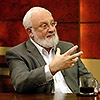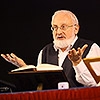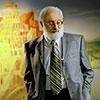Audio Version Of The Blog – 3/13/21
Listen to an Audio Version of the Blog
Download:MP3 Audio

Listen to an Audio Version of the Blog
Download:MP3 Audio
 Michael Laitman, On Quora: “What does the commandment “Thou shalt not kill” mean if not what it says?“
Michael Laitman, On Quora: “What does the commandment “Thou shalt not kill” mean if not what it says?“
The sixth commandment, “Thou shalt not kill,” means to cause no detriment whatsoever to others.
The previous five commandments explain a process that leads to us receiving the upper forces, and we need to become a receptacle that lets these forces act correctly in us, not interfering with the effect that they have on us.
Using these forces correctly means to use them for the sake of bestowal, and thus “Thou shalt not kill” means the contrary, that we use these forces for self-benefit.
In other words, if we use our connection with the spiritual forces, with the Creator, for self-benefit, then this act is called “killing.” By doing so, we kill our desire. Our desire gets killed because it becomes filled with pleasure; the pleasure aimed at self-benefit kills the desire, and the desire becomes extinguished.
Based on the TV show, “Spiritual States” with Kabbalist Dr. Michael Laitman on December 26, 2019. Written/edited by students of Kabbalist Dr. Michael Laitman.
 Question: Who is the neighbor?
Question: Who is the neighbor?
Answer: Anyone. If a person does everything it takes to keep our system in balance, then the only thing that matters for him is bestowal. In fact, it is easy. Try to think about the other and you will see how all the nonsense, all the problems disappear from your head. Just like this—from myself to the others.
Question: Is a neighbor really any person in the world?
Answer: Yes. Try it. Even at the corporeal level. At the Kabbalistic level, we already deal with the system of connections.
Comment: In order to do something for someone else, I need to get some kind of fuel. I need to understand why I am doing this.
My Response: You will be given fuel. You will also be given calories in order to act.
Question: But it is not natural for a person to think about the neighbor, right?
Answer: Ask for strength so that it will become possible.
Question: Why do I need all this?
Answer: By doing this you reach equivalence to the Creator.
[279029]
From KabTV’s “Spiritual States” 12/26/19
Related Material:
Pave The Way To Your Neighbor
Comprehend Love Of Others Through Love Of Oneself
Cancel Self-Love
 Question: Did a man or a state called Adam HaRishon, the first man, ever exist? Did he suddenly feel the tree of knowledge of good and evil within him?
Question: Did a man or a state called Adam HaRishon, the first man, ever exist? Did he suddenly feel the tree of knowledge of good and evil within him?
Answer: Yes. The tree represents states that one can aspire to and grow.
By tasting the fruit from the tree of knowledge of good and evil, he sees that it is detrimental because he begins to receive from this life in his egoistic desires instead of rising above them, and at the same time, he completely loses the whole upper world.
We exist in a certain space that is unfamiliar to us. This space can be perceived by us in its entirety only if we reveal all our inner potential, all our desires. Then it will be called the upper world.
This same space can be perceived by us in a very limited form, in our small gray world that we now feel.
The difference between the worlds is the difference between life and death, because the existence in our world is like death. I always desire something, but can never find it. Since birth, my life is a slow death.
Question: Why was Adam suddenly compelled to eat from the tree of knowledge of good and evil? After all, everything was so wonderful.
Answer: The Creator deliberately set him up so that he would understand the state he was really in. As created beings, we can only feel something relative to something else.
When Adam HaRishon was in a perfect state, he did not feel it as perfect. He did not yet have analysis or synthesis, doubts, desires, aspirations, or their fulfillments. He did not know that there were differences between them. Everything is understood in comparison. Everything is felt through its opposite.
But he did not have that opposite. He had to fall into our world in order to gradually rise from it to the higher attainment, to the upper world, to see what the Creator had in store for him.
[279112]
From KabTV’s “The Power of The Book of Zohar” #7
Related Material:
The Forbidden Fruit: The Second Failed Attempt
From Multiplicity To Unity
Correct Yourself, Correct The World
 Question: Why do we not see any changes in the external behavior of the teacher in states of ascents and descents, while we do see such changes in the friends? How do you manage to be so full of energy all the time, while others are in states of ascents and descents?
Question: Why do we not see any changes in the external behavior of the teacher in states of ascents and descents, while we do see such changes in the friends? How do you manage to be so full of energy all the time, while others are in states of ascents and descents?
Answer: I have already been through the states that you are in. Long ago I attained the recognition that these states are fleeting, and that following the evening comes the night, that after the night comes the morning, and then daytime, and that they are all helpful states.
I have understood that I must lower my head and wait, and that I may even hasten the time of dawn, the spiritual light. This is the reason that I am always in a state in which I can occupy myself by doing something.
There are states in which I must watch a political or social TV program that helps me think so that I can build up the necessary vocabulary and terminology and to understand better what is happening in the world, etc.
Other than that, I write posts on Twitter, I have meetings with the writers, who write articles to the press, several times a week. I participate in filming sessions of programs on a variety of different topics related to the wisdom of Kabbalah, psychology, etc., and I give evening lessons about The Book of Zohar. So, you can see that I work all the time.
I want to share a secret with you: I engage in different parts of the wisdom of Kabbalah according to the state I am in. There is no need, for example, for special sensitivity in order to study “The Preface to the Wisdom of Kabbalah,” or The Study of the Ten Sefirot. So, when my feelings become numb and I become like a log, I turn to these parts. On the other hand, when my feelings come to life, I engage in studying the articles in Shamati or the articles of Rabash.
Every day I need to prepare for the next day’s lesson. If the lesson begins at three am, I wake up two hours before the lesson, take a hot shower, warm myself up and make sure that I will not fall asleep. I have been living according to this schedule for over forty years, and so I have developed this habit.
I take my work very seriously. Although I know the material, I go over it before the lesson in order to get into the topic, to get into the state in which I can connect with the students, and to be ready for the contact with them, to feel them, so that they will be able to feel me.
At the beginning of every lesson, I introduce the topic to them for ten-fifteen minutes and try to present it to them in a new way. This means that it is highly creative work that requires constant mental effort, so even when I sleep, these thoughts do not leave me, and I experience it all inside me.
The students are the most important thing that I have. I relate to them with great awe. They are the basis of my life.
I think that those who come to the lesson physically or who watch them virtually feel that and advance from one day to the next.
They receive a portion of spiritual knowledge each day, feelings, and a new perspective, etc. What is more, it is not just an event or a phenomenon, but real internal renewal, it is actual work.
[243152]
From KabTV’s “Fundamentals of Kabbalah” 12/2/18
Related Material:
A Kabbalist’s Inner States
What Does It Mean To Be A Kabbalist?
Student And Teacher, Two Levels
 Comment: One of the famous Kabbalists, commentator of the Tanakh, David Altschuler wrote that before the time of King Nimrod, all people were equal and none of them rose to dominate others. But Nimrod began to dominate and rule on Earth. Then people began to build the Tower of Babel.
Comment: One of the famous Kabbalists, commentator of the Tanakh, David Altschuler wrote that before the time of King Nimrod, all people were equal and none of them rose to dominate others. But Nimrod began to dominate and rule on Earth. Then people began to build the Tower of Babel.
MyResponse: The Tower of Babel, Migdal Bavel in Hebrew, from the word “lebalbel” (confuse), means confusion, mixing of languages. This means that egoism became higher than people, and they ceased to understand each other.
Question: Here two characters appeared, Abraham and Nimrod, symbolizing good and evil, a positive and a negative force. Abraham claimed that it was necessary to unite above the contradictions that had arisen, and Nimrod proposed to disperse and settle all over the world. What is the resistance here?
Answer: Abraham called for the same unity as before. Only earlier it was natural, and now when contradictions rose up, it was necessary to achieve connection above them. Nimrod advocated for what is called capitalistic development, for a rational decision.
Both of them were right. Because, on the one hand, Abraham said: “We lived well. Now egoism has risen, and it separates us. Let us unite!” Nimrod, however, thought: “Why do we need to unite? Everything that comes from nature is good. If egoism has appeared, it will develop us. Why should we level ourselves again?”
Question: It is clear that a conflict arose between them. But since the Torah does not speak about corporeality, what does it mean, from an internal point of view, that two forces manifest in a person: Abraham and Nimrod? What are these forces?
Answer: Abraham called on people who possessed these two points to raise the point of unity, to raise it even higher, because it is for this purpose that egoism was developing.
Nimrod claimed that egoism was necessary for its own self, so that by using it we will begin to develop corporeally and technologically.
Nimrod, from the word “mered” (revolution), opposed integral nature. He was convinced that egoism should be used wherever possible.
Question: Is egoism not nature? It seems that Nimrod was going in a natural way, following his nature.
Answer: It depends on what he was following. Nature is based on balance and is in internal homeostasis. Egoism, like cancer, violates everything.
It turns out that, on the one hand, nature is built on competition, and on the other hand, it is built on interaction, on the balance of two opposite systems. One system is Nimrod, and the other is Abraham. The problem is how to balance them.
[278065]
From KabTV’s “Spiritual States” 5/13/19
Related Material:
The Method Of Nimrod And That Of Abraham
How Did the Dispute Between Abraham And Nimrod End?
The New Babel